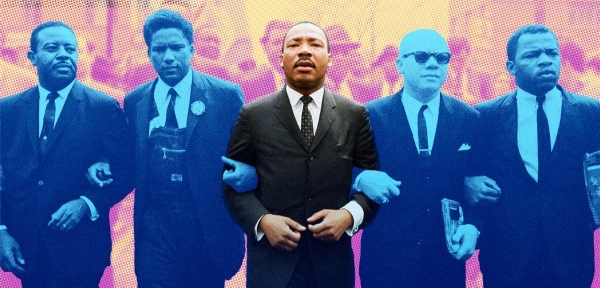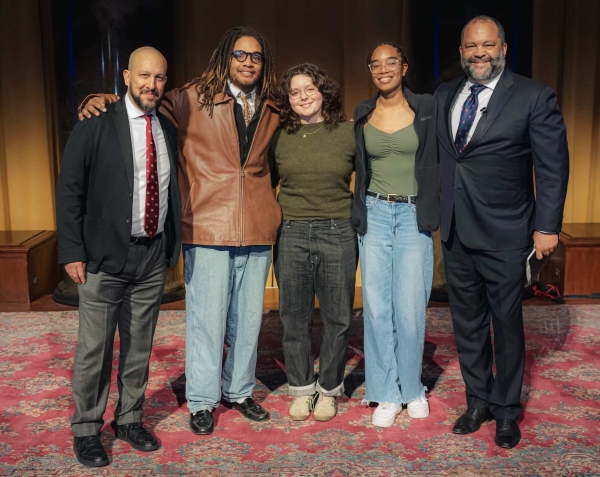
The now-annual event kicked off Spring semester programming for the Undergraduate Community Initiative, a partnership among Columbia College, Columbia Engineering and Columbia General Studies that focuses on deepening students’ understanding of and commitment to their responsibilities as members of a shared community.
Dean Josef Sorett opened the program with remarks that set the tone, emphasizing King’s advocacy for a society rooted in respect and unity, where all people — regardless of race or religion — would be treated with dignity.
“As we think about the theme of community, across all the kinds of difference that we represent and embody, this is not about the kumbaya moment,” Sorett said. “Instead it’s a commitment — and a recommitment — to the hard work of building and sustaining relationships. And of channeling the energy in this room into our collective work of building the kind of campus and community that we’re all proud to call home.”
The program also featured remarks from Engineering Dean Shih-Fu Chang, who introduced Pizmon, the co-ed pluralistic Jewish a cappella group of Columbia, Barnard and the Jewish Theological Seminary. General Studies Dean Caroline Marvin, standing in for Dean Lisa Rosen-Metsch, introduced three Practices in Community Building fellows who read excerpts from King’s speeches, conversations and texts, and reflected on what his words meant to them.
Eva Carthy GS’26 read from King’s 1964 Nobel Peace Prize acceptance speech, and focused on his legacy of influence in international civil rights movements; Yahney-Marie Sangare CC’28 referenced King’s keynote at the 1968 convention of the Rabbinical Assembly and his discussion with Rabbi Abraham Heschel, regarding moral religious leadership; and Joseph Jojoe SEAS’27 read from King’s final book, Where Do We Go From Here: Chaos or Community?, reflecting on person-oriented thinking as a means to building community.

Ben Jealous CC’94’s nieces and nephew were in attendance at the MLK event. Left to right: Dean Josef Sorett, Dylan Farley CC’25, Nina Feldman BC’25 , Emma Farley CC’27 and Jealous.
BRANDON VALLEJO
Jealous spoke about “Dr. King’s king,” Frederick Douglass, and — in describing the need to form communities across differences in order to create lasting change — shared the little-known history of the Readjusters, a biracial, bipartisan political party that formed in Virginia during the turbulent period following Reconstruction. He then detailed three things members of the Columbia community can do to “finish the work Dr. King died doing.”
The first, “walking the walk,” encourages people to get out of “comfortable coalitions” alongside others with whom they agree on everything. “What’s far more urgent in a democracy is to find one thing you can agree on and go get that done, because that’s how we pass laws, issue by issue,” Jealous said.
“The second thing is, you’ve got to talk,” he continued. “If you look at King’s speeches, if you look at the speeches of his peers, the great progressive leaders of the 20th century, you will find that they all speak four vocabularies: the language of love, the language of faith, the language of aspiration — desiring for each generation to do little better — and the language of patriotism.”
Lastly, Jealous said, is the need to refocus on opportunities for upward mobility. “As a nation, we have to get real about rebuilding our ability to make things, to create jobs for people who don’t have college degrees, and upward mobility for America’s working people,” he said. “We must find a way to make sure that jobs are still being created, and that America is positioned to lead the world in this century economically — as we did in the 20th century.”
In summary, he said, “Walk King’s walk, talk King’s talk and let’s get America’s working people working again so they stop turning against each other.”
The evening closed with a performance by the newly re-formed Columbia University Gospel Choir, and some last thoughts from Sorett. “King’s words, especially those recited this evening, remind us that he did not need singular or clear guidance for navigating the current moment,” Sorett said. “His story is one of complexity, of nuance, of expansive thinking; one that defies simple categorization. And that is for us all, a lesson.
“As we embrace the complexity and the contradictions of our own community, it is through that complexity and contradiction that we will find our path forward, as we continue to do that hard work across our differences.”